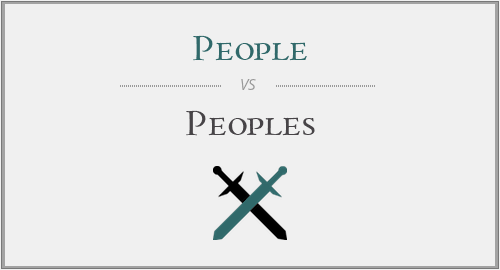Person
When we refer to a human being, we say a person. For example, a nice person, the last person to attend the conference and so on…
When there are many human beings or individuals, we refer to them as persons. Example,
· Three persons came asking about you.
· I was one of the few persons who were recognized for their good work.
Note that ‘persons’ is used in a very formal sense. In fact, most of the times in legal documents or contexts.
People
We often use people in place of persons to indicate a group of human beings. We can say,
· Three people came asking about you.
· I was one of the few people who were recognized for their good work.
The three or few human beings are collectively called as people. People is a general term used for a group of persons.
This means people is a plural word already.
So, what is peoples?

Peoples
Peoples refers to members of a particular community, nation or ethnicity. This can be a race or a tribe. Example – the native peoples of India speak at least 2 different local dialects.
So, we can say peoples as a group of people that belong to a particular community and live in a certain region. Example –
Different peoples of India speak different languages and follow diverse traditions.
Sometimes, we can get confused between the words ‘peoples’ and ‘pupils’.
Pupils
Pupil (in the current context) is a student, a scholar or a person who learns from a teacher or another learned person. Pupils is the plural of pupil and refers to a group of students or scholars.
· Our pupils are capable of making great scientific breakthroughs, with the infrastructure available in our premises.
· The pupils were the library when the warden came for inspection.
Since people and pupil sound somewhat similar, they can be confused easily. Note that pupil is a singular noun, whereas people is plural. Pupil refers to only students while people is a general notation for any group of individuals.
Keep these tips in mind to always use the right word at the right time and place.




Have a discussion about this article with the community:
Report Comment
We're doing our best to make sure our content is useful, accurate and safe.
If by any chance you spot an inappropriate comment while navigating through our website please use this form to let us know, and we'll take care of it shortly.
Attachment
You need to be logged in to favorite.
Log In